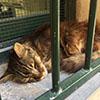Women against Women
By aayzahmirzaOctober 2, 2015 - 14:09

In my first paper, I divulged the gender discrimination I had faced at the hands of my high school administration.
Serendip is an independent site partnering with faculty at multiple colleges and universities around the world. Happy exploring!

In my first paper, I divulged the gender discrimination I had faced at the hands of my high school administration.



Dear Mom,
I tried to write this letter in theory. Weaving together well-crafted strands of academic prose, I knew you would take from it what I wanted you to—the editor in you comes out in the most personal, un-academic situations. I got that from you, this appreciation and reverence for published text. When I wrote that email a couple months ago, telling you that I wanted surgery, I clouded my truths with celebrated theorists, as if backing up an argument with credible sources. You understood, to some extent—responding with the same language I had introduced.

I mispoke today when I said that "Save the Children" was an organization founded by Nicholas Kristoff; it serves, rather, as his exemplar organization. A Path Appears is the sequel to the highly-acclaimed PBS film Half the Sky; both are based on books written by Kristof and his wife, Sheryl WuDunn. You might be particularly interested in the episode entitled "Breaking the Cycle of Poverty," which features West Virginia families participating in Save the Children's early education program.

The Slippage of Play
Last week I wrote an essay about the lack of diversity and complexity in the conventional understanding of play, and just a week before that I applied the concept of “slippage” (Dalke) to the “Black at Bryn Mawr” tour. Despite the close proximity timewise between these two essays, I failed to realize my own slippages in my essay about play, further illustrating the pervasiveness of play. Just like how I analyzed the layers of slippage, or thoughts and words that emerge from our unconscious socialized past (“Paradox”), of the “Black at Bryn Mawr” tour, here I will explain slippages of the concept of play itself, my essay about play, and why I slipped even after writing an essay focused on slippage.

Just a few months ago, I found myself trying to choose a college to attend in the coming fall – similar to most high school seniors across America. As I compared academics and extracurriculars and student:teacher ratios and graduation rates, I tried reaching out to alumni of my high school who had gone to the various colleges I had narrowed down to. Surprisingly, no one from my high school had chosen Bryn Mawr College for several years. Very few students had heard of Bryn Mawr at all. After much probing, I finally reached my friend’s adult sister, who had graduated from Bryn Mawr College over a decade ago.

Rainy days have never been my favourite, and when I realized that today was going to be one of those damp, depressing days, I chose a site where we could be wam and dry. The yellow light in the Pem East TV room had some semblance to the warm rays of the sun, and coupled with the comfortable cushions and sofas, it created an environment where being in class seemed more like a group chat than a formal, academic session. In my opinion, there were not too many distractions, as it was an ecnclosed space. At the same time it was not constricting and as some people made themselves comfortable on the couch, others lay down on the rug, adding to the casual and cozy aura of the room.

After reading Anne Dalke’s, “Slipping into Something More (Un)comfortable,” I have spent a lot of time mulling over the possibilities of what it really means to “slip.” I rationalized that “slipping,” in a broader sense of the word, means unconsciously allowing one’s own actions to negatively impact others. While the definition I have derived can be applied to an extensive variety of situations, a more limited and possibly closer definition to the one Dalke intended for her novel is that to slip is to unintentionally revert to a mentally constraining belief or set of beliefs ingrained by societal norms.

Introductions - Tong
Freewriting/Silent time - Meera
I began my research with the intent of finding the connection between "civil death" and the maintainence of white supremacy. I'm still interested in learning more about this topic, but I'd like to open up my research to consider the connection between the maintenance of white supremacy and the actual purpose of prisons. Civil death still falls under this category, but instead of focusing on what I believe is a manifestation of the underlying oppressive social structures, I'd like to shine a light on the oppressive structures at play.